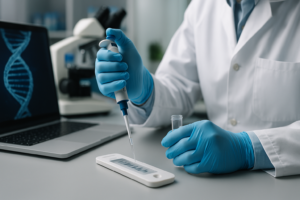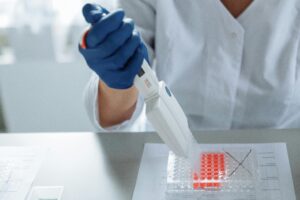Short answer – yes. Here’s how to use that to your advantage:

You’ve tried the sleep masks, you’ve bought the great new mattress, you’ve tried putting your phone away before bed…
but you STILL can’t sleep at night. You think maybe it’s hopeless.
Genetics is a major reason why Americans have trouble sleeping.
Many people shrug off their sleepless nights or blame it on “getting older”, but insomnia is more harmful than you think.
Insomnia leads to much more serious problems, such as:
- High blood pressure
- Heart disease
- Obesity
- Diabetes
- Asthma
- Cancer
How do genes factor in
The bad news is that insomnia is linked to genetics. The millions of genetic variants inside you that you didn’t get to choose may be robbing you of precious sleep.
And I don’t mean that there‘s a specific gene variant that condemns it’s carriers to insomnia. It’s not that simple.
There are many genetic variants (over 800,000 discovered so far) that contribute to insomnia by influencing things like the circadian rhythm, brain function, stress response and alertness.
In fact, up to 40% of differences in people’s chances of getting insomnia may be attributed to genetics.
Using this to your advantage
Having a genetic risk for insomnia doesn’t mean you are condemned to having insomnia.
There are plenty of people out there with high genetic risks for insomnia who have never had trouble sleeping.
So why do some people realize their genetic risk and others don’t? Because of gene expression…
Your gene expression is dependent on a number of things: your lifestyle, your diet, your environment.
Some people may have high genetic risk for insomnia but live a lifestyle that helps them decrease expression of the genes most influential to their high risk. These people may go their whole lives without even knowing their genetic risk since it’s never been an issue.
Gene expression is the secret to using your DNA to your advantage. By understanding which genetic variants are causing your insomnia, it’ll be much easier to understand what you need to do to either increase or decrease those genes’ expression and sleep tight, finally.
I’ll use myself as an example
Like many people, I struggled with sleep for years. I brushed it off for a bit, but it became a real problem when it affected the rest of my life – I was irritable, anxious, and couldn’t focus.
I even considered seeking prescription sleep medication from my doctor.
But I’m lucky to live at the time I do. With today’s personalized health technology, I was able to pinpoint the genetic variants causing my sleepless nights.
Three of my gene variants were especially impacting my heart health: MTNR1A, CLOCK, and GABRG2.
The MTNR1A gene encodes for a melatonin receptor, which has a huge role in inducing sleep.
People with my MTNR1A variant are more sensitive to disrupted sleep schedules. My Insomnia Report recommended I get more bright light during the day to help balance my sleep schedule.
The CLOCK gene is one of the main genes responsible for regulating our circadian rhythms (the 24-hour cycle that regulates sleep and wakefulness).
People with my CLOCK gene variant are more likely to develop insomnia because they tend to have higher melatonin levels in the morning and lower levels at night. To counteract this, my Insomnia Report recommends that I take melatonin before sleep.
The GABRG2 gene encodes for a GABA receptor, a chemical that lowers brain cell activity and relaxes the mind.
My GABRG2 gene variant likely lowers my activity of GABA, so my Insomnia Report recommended I use Valerian Root, which is known to boost GABA.
After going through and implementing the recommendations from my Insomnia Report, I’ve been able to sleep much better on a consistent basis – something I never thought I’d be able to say a few years ago.
If you’re interested in seeing your own genetic risks for Insomnia and optimizing your sleep, SelfDecode’s Insomnia Report analyzes 808,802 genetic variants linked to insomnia, giving you the fullest possible picture of your health.








